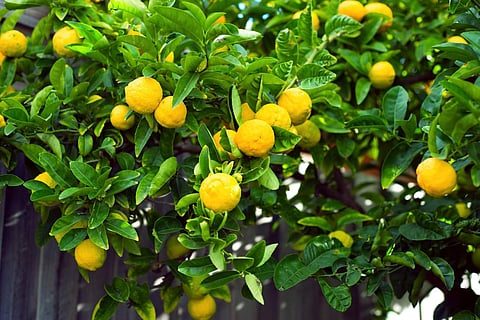
- LIFESTYLE
- FASHION
- FOOD
- ENTERTAINMENT
- EVENTS
- CULTURE
- VIDEOS
- WEB STORIES
- GALLERIES
- GADGETS
- CAR & BIKE
- SOCIETY
- TRAVEL
- NORTH EAST
- INDULGE CONNECT

The International Day of Biological Diversity is an excuse to reflect on what mother nature means to us. The simple act of planting a tree can make a big difference. According to Grow-Trees.com, a social organisation responsible for planting millions of trees across India, here are five most common varieties of trees that can be planted easily around your homes:
Lemon tree: Plant lemon and be stunned by the power-packed in this small evergreen tree that reaches up to 11 feet in height and offers flowers and ripe fruits at the same time. Every part of the fruit is usable, be it the juice, the pulp or the rind. Lemon juice is even used widely in educational science experiments and contains unique flavonoid compounds that have antioxidant and anti-cancer properties. Lemon also helps our skin, digestive and immune system because of its high Vitamin C content.
Amla tree: Amla or Indian gooseberry is known for remarkable remedial qualities and is another small to medium-sized tree that has a limitless abundance. The amla fruit contains more than 80% of water and also has protein, carbohydrates, fibre, minerals, and vitamins. It also contains gallic acid which is a potent polyphenol. Just 100 gms of amla gives us over 700 mg of Vitamin C. It is also considered to be nature's best antioxidant.
Drumstick tree: Drumstick or Moringa Oleifera is one of the most cultivated trees in India. It is a small shrub or tree that can reach 12m in height and can live for up to 20 years. With increasing emphasis on healthy eating, it is being projected as a nutrition powerhouse. Fast-growing and drought-resistant; it offers itself from roots to the leaves, for our benefit and in developing countries, it has the potential to improve nutrition, boost food security, foster rural development, and support sustainable Landcare.
Shikakai tree: Shikakai or Acacia concinna is a climbing shrub common in the warm plains of central and south India. The pods of this plant are rich in saponins and the dried fruits are used widely to manufacture herbal hair care products. No wonder then, ‘Shikakai’ literally translates as "fruit for the hair”. An infusion of the leaves is also used to combat malarial fever. A decoction of the pods relieves biliousness and acts as a purgative. It is also used to remove dandruff.
Bamboo tree: These are perennial evergreen flowering plants and boast great economic and cultural importance. Architects around the world are waking up to their value as a sustainable and versatile building material. They are also a plant raw material for crafts and home products. Known to be one of the fastest-growing plants in the world, they are a perfect solution for alleviating many environmental and social problems, including the consequences of tropical deforestation. Bamboo groves are also an important part of the forest ecosystem and also work effectively as carbon sinks.